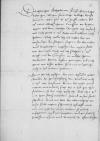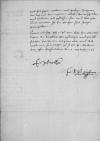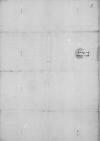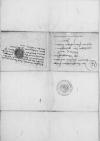Dem durchlauchtenn, hochgebornenn furstenn und hern, / [hern] ⌊[Albre]cht⌋, marggraffenn [zcw] ⌊[Brand]enburg⌋ etc. unnd herczogen inn ⌊Prewssenn⌋, / meÿnem freuntlichen, lieben hernn /
Durchlauchter, hochgeborner furst, / fruntlicher liber her. / Meÿnn freuntliche, willige dienste zcuvoran. /
Mir sein Ewer Irbarkeit ⌊⌋ nebenn ⌊koniglicher maiestet⌋, meins allergnedigsten hernn, commission vor dreÿen tagenn wurdenn, / welcher innehalt ich vorstanden. / Wil mich gerne Ewer Irbarkeit beger unnd willenn noch haltenn, / idoch woldt ich vil lieber, das ein vorstendiger zcw solchenn sachenn, / die greniczen unnd dergleichenn angehen, / inn meÿne stelle wer benumpt. / Auch wil ich solchenn Ewer Irbarkeit brieff mit der commission an ⌊andere hernn⌋, darinnenn benent, / lossenn gelangen / und mich gerne, / wie bisher gethan, / sovil mir mugelich / noch Ewer Irbarkeit willenn haltenn. /
Gerne het ich gesehnn, das mein besunder gutter bruder, der her ⌊Nÿbschicz⌋, inn beredung mith Ewer Irbarkeit wer zcwsamne kommen, / der meÿn / unnd meÿner armenn leuth sache beÿ Ewer Irbarkeit het thun furdernn. / So das nicht geschicht, / bitt ich Ewer Irbarkeit mit hoem fleisz, mitleidenn habend unsers feurschadens, / domit uns Gott der allemechtige von unser sundt wegenn schwerlich gestrofft, / wolt mir mit meÿnenn armen leuttenn so guttig erscheinenn / unnd uns zcwgebenn / unnd gunstiglich zcwlossenn / czÿmmer unnd bawholcz in osterrodischen unnd eÿlischenn weldenn unnd heidenn zcwhawen, / das ich mit denn meÿnenn alleczeit zcw vorschulden unnd vordinenn wil geflissenn sein / unnd Gott gebe nummer vonnotenn seÿ inn gleichem fhal solches zcuvorgeldenn. /
Hiemit wunsche ich Ewer Irbarkeit vonn Gotte dem allemechtigenn inn langkweriger gesuntheit unnd gelugkseligem zcwnhemenn / vil gutter czeit / unnd bitt, woldt mein fruntlicher, gunstiger her bleibenn. /



